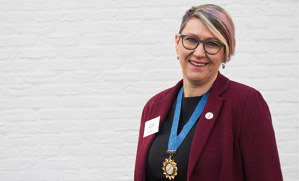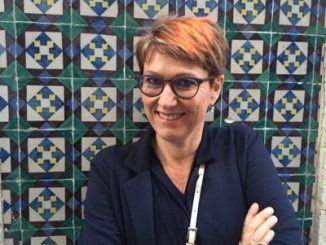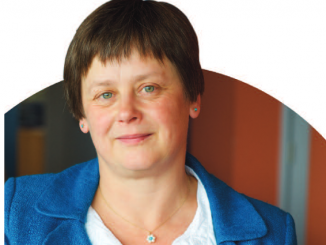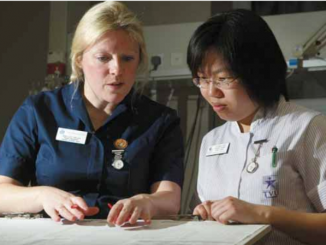The European Oncology Nursing Society is a pan-European organisation dedicated to the support and development of cancer nursing. It recently completed a landmark research project – RECaN – aimed at increasing recognition of the value and contribution of cancer nursing across Europe. Cancer World asked EONS president Lena Sharp what they learned and why it matters.
Cancer World: Recognition for specialist cancer nursing is clearly important to nurses. Does it matter to patients?
Lena Sharp: The fact that so many countries do not recognise cancer nursing as a speciality and therefore don’t offer specialist training is a big problem for patients. It deprives them of access to cancer nursing competence, such as psychosocial support and symptom management. It also affects their safety. In some countries, nurses with no, or minimal, education in cancer care prepare, administer and monitor complex cancer drugs. We also know from the RECaN project that cancer nurses are less inclined to report errors in countries where they have less recognition.
CW: What did you learn from the project?

LS: From a systematic review, based on 351 papers [Int J Nurs Studies 2018, 86:36-43], we learned that the nursing contribution to cancer care and cancer research is significant and varied: nurses are producing high-quality, innovative and cutting edge research, and nurse-led interventions are increasing in frequency and complexity. The preliminary results of a meta-analysis show that there can be benefits in terms of the quality, no safety concerns and also economic benefits from having nurses rather than physicians leading certain cancer services.
The RECaN project also compared cancer nursing across four different countries – Estonia, Germany, the Netherlands and the UK – and found significant differences regarding tasks, roles, education, responsibilities, autonomy, safety culture and recognition.
CW: What are the hurdles to achieving better recognition of cancer nursing and enabling nurses to contribute more to care across Europe?
LS: A big hurdle, and the hardest one to change, is hierarchical structures in healthcare. These structures strongly impact the culture in an organisation, which affects important quality factors such as patient safety. In the RECaN study, we found clear signs of hierarchical impact in the countries with little recognition of nursing.
In Germany, for instance, most nurses do not have university education, but those who do, and complete a Masters in nursing, find the salary increment that applies for all other healthcare professionals on obtaining their Masters does not apply to them! There is a forceful lobby against higher education for nurses in Germany. The German nursing organisations strongly contest the argument that ‘compassion’ alone is all it takes to provide effective and safe care, but they meet very little interest from political or other stakeholders.
What is interesting is the contrast with the Netherlands, which borders on Germany, and where national guidelines stipulate that all cancer drugs should be delivered by oncology nurse specialists. Dutch cancer nurses have a recognised career path and are required to complete a two-year cancer nursing programme based on a national curriculum.
Estonia, another of the countries in the RECaN project, has had a similar structure and culture to Germany, but it’s encouraging to see that beginning to change. When EONS first visited Estonia in May 2017, we met with different stakeholders, including hospital leaders, to discuss recognition and the need for specialist training for cancer nurses. The response was very positive and we are very happy that the first Masters programme in nursing started in September 2018, with 120 nurses currently in the programme.
CW: How important is cancer education for EONS?
LS: We recently published the EONS Cancer Nursing Education Framework, which is important on two levels. At a practical level it helps universities across Europe to shape cancer nursing programmes. At a broader level, by describing and explaining the competencies of cancer nursing, it helps increase recognition of cancer nursing as a specialism that has a positive impact on the lives of people affected by cancer. This in turn strengthens the argument that cancer nursing should be recognised by the cancer community, and by national- and European-level policy makers, as a profession with specialised training and qualifications available across the continent.
The collaboration with the European School of Oncology is important here. The ESO–EONS Eastern Europe and Balkan region joint Masterclass in Cancer Nursing (Budapest, September 2018) was the first educational event based on the new EONS framework. It worked really well and the plan is to base all EONS educational events around the Cancer Nursing Education Framework.
CW: Why does EONS prefer the term ‘multiprofessional’ to ‘multidisciplinary’?
LS: Medical oncology, radiotherapy, surgery, pathology, radiology are all disciplines within medicine. Nursing is not. Medics and nurses are professionals with different disciplines, and nursing has its own specialist disciplines, including cancer nursing. Very often the term ‘multidisciplinary’ is used to describe the medical members of a multidisciplinary team, with nursing lumped in among them – very often at the end. We feel this hinders recognition of cancer nursing as a distinct profession.
CW: Cancer care will increasingly take place in community settings. Is EONS part of conversations about how this will happen?
LS: Absolutely! We welcome the stronger role of primary care in cancer care for nursing and other professions. This is one of the reasons why we prefer the broader term ‘cancer nurse’, because our specialist nurses don’t just care for cancer patients being treated in an oncology setting, but also in primary and palliative care settings. This move towards more community and home-based care is reflected in the EONS Cancer Nursing Education Framework, which covers competencies in cancer nursing from primary prevention to early detection, treatment, rehabilitation, and palliative and end-of-life care.
Lena Sharp, RN, PhD, was elected president of the European Oncology Nursing Society in 2017. She is the Head of the Regional Cancer Centre, Stockholm-Gotland, in Sweden. She teaches regularly at nursing schools and postgraduate nursing courses, she has been a faculty member for the annual ESO‒EONS Masterclass in Oncology Nursing for many years, and was the project lead for the EONS Cancer Nursing Education Framework published in 2018.
Prior to taking up her post at the Regional Cancer Centre, Lena Sharp was the chief nursing officer and patient safety coordinator at the Department of Oncology at Karolinska University Hospital. Her main focus in research is patient safety, communication, leadership and cancer care organisation.





